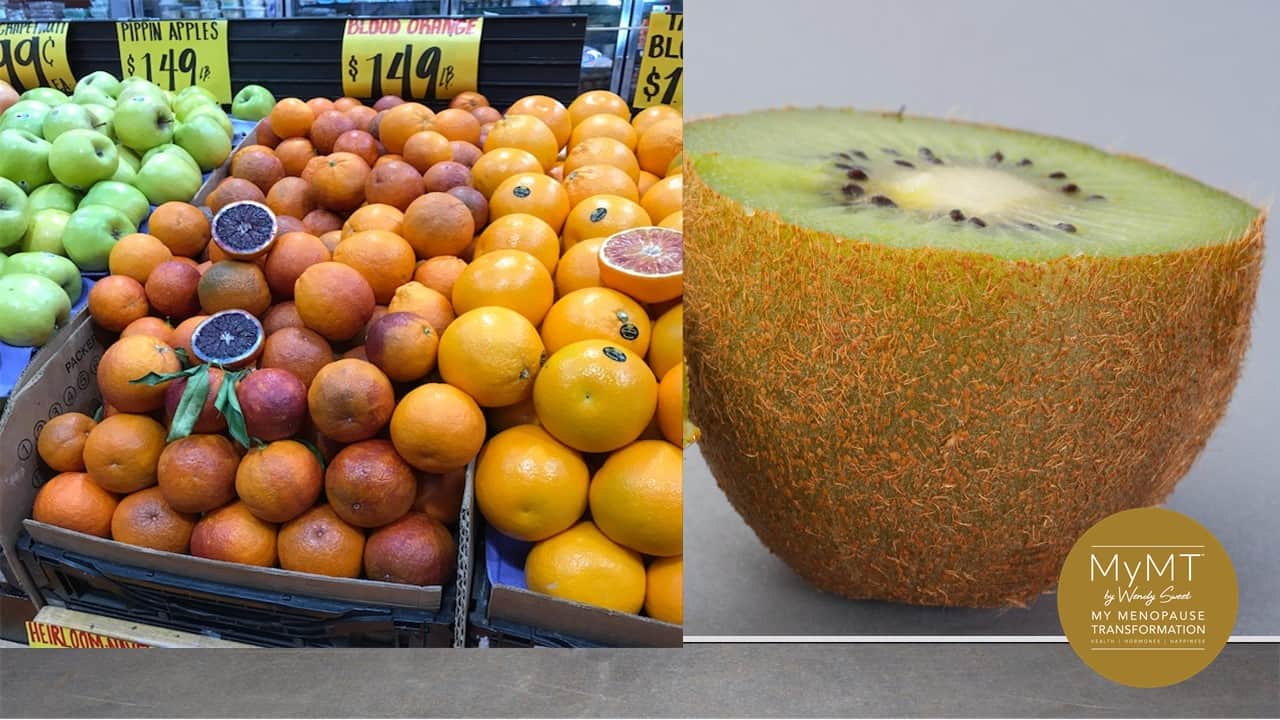If you are an exerciser and going through menopause, and your joints are sore or you are feeling exhausted, then you may think that you need more collagen. The collagen industry is booming and women arriving in mid-life are often the target. But what many women don’t realise, is that it may not be expensive collagen sitting on a shelf in their pharmacy that they need. It might be the very much cheaper blood oranges or kiwifruit, high in Vitamin C, sitting at your green-grocer instead. Many women who are exercisers don’t realise that to turn over collagen (in joints as well as skin), this vital Vitamin-C is needed as well.
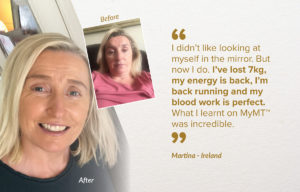
And what about your heart rate? Can you feel it when it’s elevated and you aren’t even exercising? Perhaps you feel more anxious when you’re lying in bed at night. Or you’re doing weight training or Boot Camps or Cross-fit and you just don’t seem to fire-up the way you used to, nor do you recover very well. You’re hobbling out of bed in the morning and suddenly, your knees ache and your arch of your foot starts to give you pain. Yes?
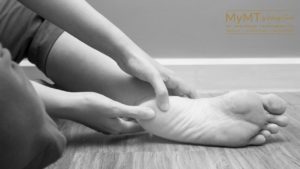
With the promise of mid-life nirvana, whereby all our aches and pains miraculously go away, we end up spending hundreds of dollars on supplements, specialists and various nutrition programmes. They don’t call us the ‘consumer generation’ for nothing. With our pantry starting to look like a health supplement shop, you think that the supplements work and many of them do … for a while.
Many of my doctoral subjects were the same. Positioning their ‘healthy ageing’ in doing lots of exercise, they spoke of sore joints, aching knees and various symptoms that none of them identified with their menopause transition. I was the same.
When my legs were aching, my joints were sore, my heart-rate was elevated at rest and I had no energy, I was still doing lots exercise. After-all, this was the way I had managed my weight over the years. My pantry was also full of supplements, collagen included. All supplements that I was advised to take during menopause. But now I realise that I didn’t need all those supplements. My body needed something else. A beautiful nutrient that heals collagen and our internal cells and is powerful for reducing inflammation.
With my head buried in the women’s healthy ageing research and the plethora of research that pointed towards changing cardiac, gut and joint health during this time of life, I realised that there were things I needed to be doing differently – things that were positioned in the ageing science, not the menopause supplement industry.
Menopause is the biological gateway to our ageing. It’s also the opposite life-stage of puberty. Think about it – back then, we didn’t need supplements or hormone therapies did we?
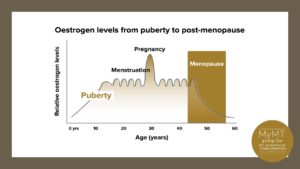
Menopause is a time of life that makes us vulnerable to increasing inflammation in our cells and tissues. Especially for women who are exercisers. As such, we need to focus first on repairing gut health, joint health and reducing the build-up of inflammation.
With a lifetime of changes to our food production and with many of us having been regular exercisers and have been following the high-intensity mantra then turning around inflammation inside our tissues and blood vessels matters. This is why we don’t need diets that are intended for younger people, males and athletes, as many of them are.
One of the most important nutrients needed by women as we age is Vitamin C. Not only for collagen renewal, but also because it works with iron. In peri-menopause if you are still menstruating then your iron levels fluctuate each month, but as you move towards post-menopause, when your periods have ceased for a year or more, your iron needs differ. I talk about this in another article HERE.
Iron and Vitamin C are two nutrients that work together. When we experience cardiac palpitations and if we are experiencing heavy periods in peri-menopause, then iron or stored iron (ferritin) may be low. So too may be Vitamin B12 and I encourage you to get levels of all these nutrients tested when you can.
Iron can also be low if we do a lot of running or if we are stressed or have a lot of inflammation in our body. As such the ability for iron to bind to red blood cells and attach oxygen may be compromised as well. This is well known in female athletes who become anaemic. Their performance drops off and their heart rate increases and they become very fatigued. Sound familiar?
But back to Vitamin C. It was whilst staying in Switzerland supporting my son, who is a competitive skier, that I first came across blood oranges. High in Vitamin C, I needed them to reduce the inflammation from a lifestyle whereby I was hiking and skiing nearly every day. The human body loses approximately 3% of its Vitamin C just in normal day to day metabolism, but if you are exercising intensely, then you can double this loss. I talk about this in my JOINT HEALTH module which is included in the MyMT programmes and is making such a difference to women’s lives and their ability to exercise again.
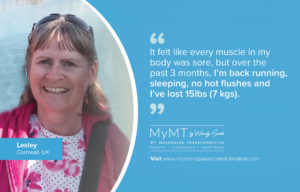
Vitamin C is a ‘first-line’ anti-oxidant acting as a ‘free radical scavenger’. This means that Vitamin C is an important nutrient that helps to protect cells from the damage caused by harmful substances (called ‘free radicals’), including the damage caused from inflammation.
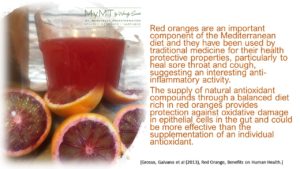
Vitamin C is also important for iron absorption, collagen repair and it helps to make hormones too. The highest concentrations of collagen in the human body are found in tendons, skin, artery walls, the cornea in the eyes, the endomysium (this is the sheath which surrounds muscle fibres which gets tight as we lose oestrogen), cartilage and the organic part of bones and teeth.
Your body needs Vitamin C to reduce inflammation.
I first came across the literature on blood oranges when I read scientist, Helena Attlee’s book called ‘The Land Where Lemons Grow’. Travelling around Italy, she writes about the cultural and scientific interest in lemons, oranges and mandarins and relates this to numerous health benefits. Blood oranges are grown in Sicily in Italy, Spain and California (I haven’t been able to find them in New Zealand as yet).
In recent years, there has been increasing public interest in plant antioxidants, thanks to the potential anti-carcinogenic (anti-cancer) and cardio-protective (heart protective) actions influenced by their biochemical properties.
The red (or blood) orange (Citrus sinensis) is a pigmented sweet orange variety typical of eastern Sicily (southern Italy). Research supports their huge contribution to an anti-inflammatory and heart-protective as well as anti-cancer diet. Blood oranges help enzymes to fight harmful free-radicals in the body.
When my own menopause symptom journey took me towards women’s healthy ageing research, I learnt how vascular stiffness occurs. This is a normal part of our ageing and this is so important to understand that I include it in my 12 week programmes. Because of the increased vascular stiffness in blood and lymphatic vessels, the importance of specific nutrients in our diet can’t be over-stated. It’s important for improved cardiac health as well.
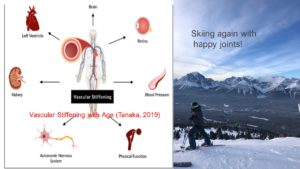
Increasing our resilience as we age, is all about turning around our symptoms in menopause or at least preventing the symptoms changing the course of our health as we age. I can’t emphasise this enough.
Our cells are always turning over and with this in mind, over the 3 months that women are on the programme with me, I encourage them to change their lifestyle to enable their body to adjust to this life-stage and/or turn existing symptoms around.
If you look at the symptoms of lowered Vitamin C, you will see a host of issues from low energy, to easy bruising, to painful, swollen joints, to skin problems and more. All factors that get gathered up as ‘menopause symptoms’ and are then normalised within an ‘age-decline’ paradigm. But when you actually make the time to get the right nutrients into your body (and not necessarily from manufactured supplements), then surprisingly, many of these symptoms go away.
When you aren’t sleeping, you aren’t recovering from exercise and your inflammation can become worse. This then increases our body’s demand for Vitamin C and other nutrients that the body needs to help re-balance itself. I had no idea about this with my own symptoms and sore joints and neither did many other women on my programme who are regular exercisers.
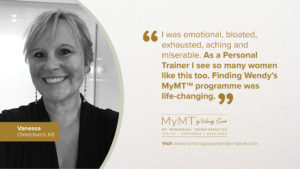
Research changed my life and I want my programme to change yours too. At MyMT you join me on either or my 12 week programmes to turn around your symptoms and/or lose weight or to prevent symptoms occurring. The programmes are delivered in a progressive format and as you discover my powerful scientific strategies, you develop confidence and clarity in moving through or beyond this powerful life-stage. I focus you on healing from the inside-out so your symptoms don’t take over your life as they used to do in my life as well.
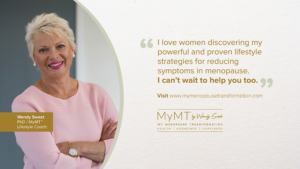
Dr Wendy Sweet, [PhD], MyMT™ Founder and Coach/Member: Australasian Society of Lifestyle Medicine.
References:
Buscemi, S., Arcolio, G. et al., (2012). Effects of red orange juice intake on endothelial function and inflammatory markers in adult subjects with increased cardiovascular risk. Am. J. of Clinical Nutrition, 95(5):1089-95.
Delanghe, J., Langlois, M., De Buyzere, M. et al (2011). Vitamin C deficiency: more than just a nutritional disorder. Genes Nutr., 6:341–346
Grosso, G., Galvano, F., Mistretta, F. et al.(2013). Red Orange: Epidemiological Evidence of Its Benefits on Human Health. Oxidative Medicine and Cellular Longevity, ArticleID157240, 1-11.
Pullar, J., Carr A. & Vissers, M. (2017). The roles of Vitamin C in skin health. Nutrients, 9, 866; doi:10.3390/nu908086
